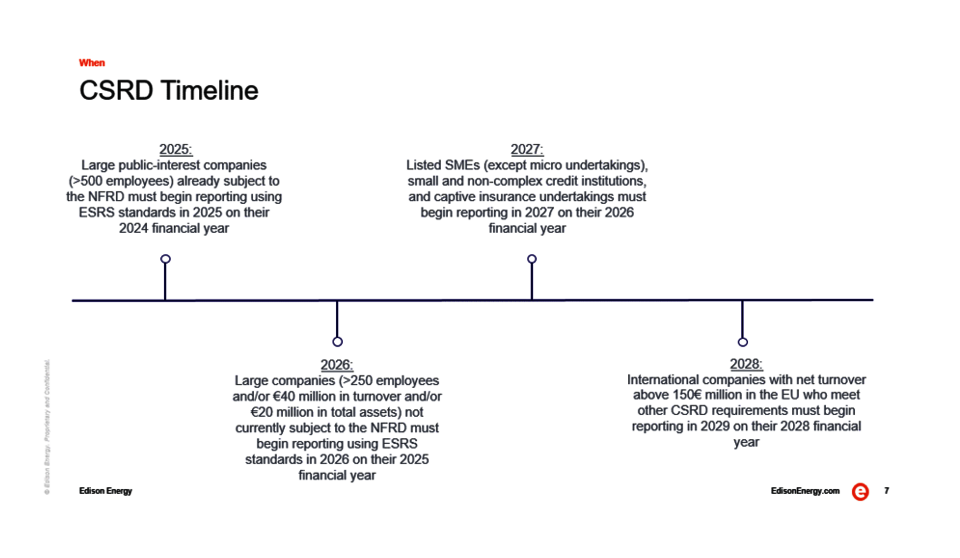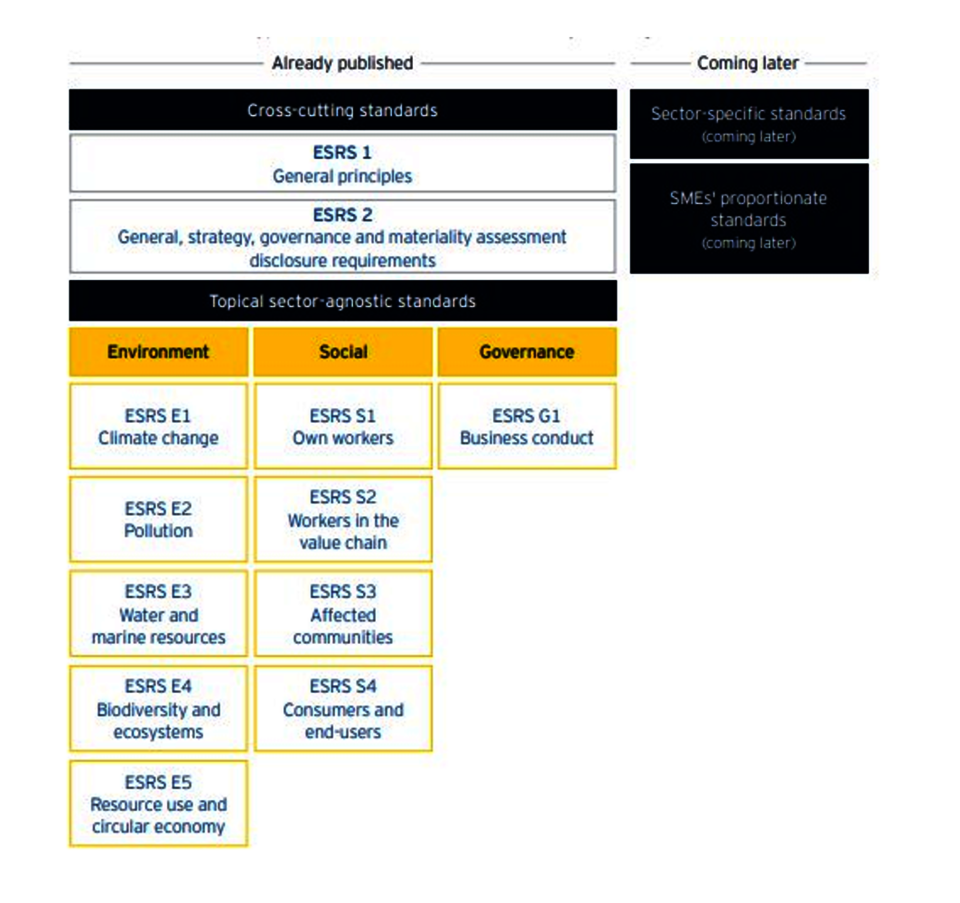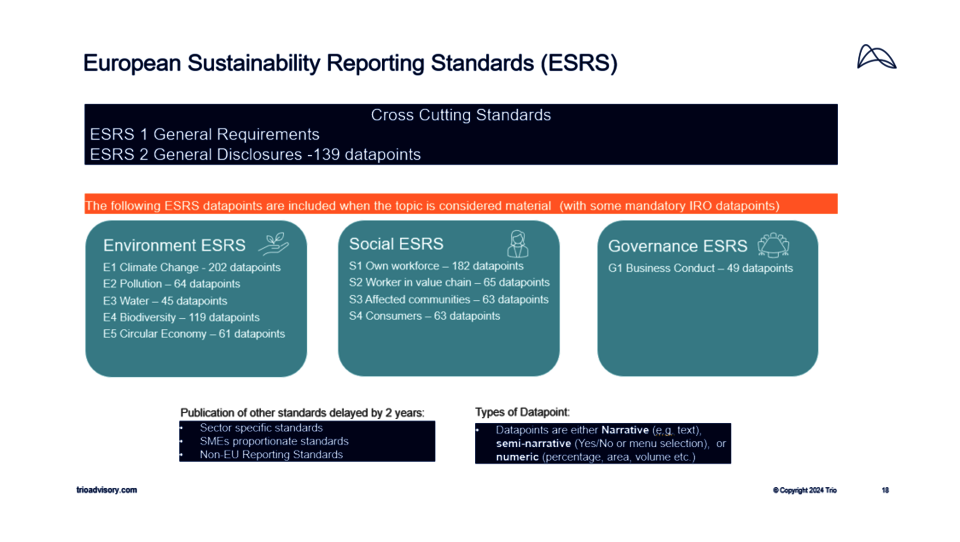The lowdown on the EU’s Corporate Sustainability Reporting Directive

By Alma Zino, Client Relationship Manager
What is the Corporate Sustainability Reporting Directive (CSRD)?
The Corporate Sustainability Reporting Directive (CSRD), which went into effect in January 2023, is a new regulatory framework that modernizes and strengthens the rules around environmental, sustainability, and governance (ESG) reporting for companies operating in the European Union (EU).
The new rules will ensure that investors and other stakeholders have access to the information they need to understand the impact of companies on people and the environment. It also enables investors to assess financial risks and opportunities arising from climate change and other sustainability-related issues. The new framework, which replaces the corporate sustainability reporting framework for non-financial disclosure (NFRD), was introduced to:
- Standardize non-financial reporting and align with financial disclosures
- Increase transparency of sustainability-related matters that are material to a reporting entity, taking into consideration both internal and external stakeholders and introducing the concept of double materiality
- Improve the quality and availability of data for investors looking for non-financial risks affecting the reporting entity
Who is impacted by the new directive?
CSRD applies to more than 50,000 companies operating within the EU, including non-EU subsidiaries and companies that don’t operate within the Union’s borders but earn significant revenue within its territory. Significant revenue is defined as €150 million or more in total company revenue over the last two years.
As the CSRD encompasses 300% more companies than the NFRD, all companies that fall outside of the current NFRD requirements and meet any two of the following criteria will be subject to CSRD compliance:
- More than 250 employees (annual average)
- More than €50M in net turnover
- More than €25M in total assets
Application of the CSRD will be gradually phased in according to the timeline below:

How will reporting be done?
Reporting companies will have to follow the European Sustainability Reporting Standards (ESRS) and report their performance across a potential set of over 1000 KPIs (subject to the companies materiality assessment).


Challenges and opportunities
Given the scope and complexity of the CSRD, it can be argued that the new reporting framework adds to the already complex nature of sustainability management and ESG, creating both a financial and operational burden for the reporting entities. However, many companies see sustainability reporting as an opportunity for improvement.
A recent poll conducted by the 2024 Global ESG Practitioner Survey revealed that 87% of respondents found it challenging to adapt reporting processes to comply with new regulations. Notably, that same survey found that 81% of companies not subject to the CSRD still plan to comply.
The conflicting results may be due to the many available opportunities for companies through CSRD compliance:
- Mitigating risk – improved ESG data will lead to increased transparency around specific risks for each reporting company, enabling companies to focus on risk mitigation policies and mechanisms and create long-term strategies.
- Protecting reputation – a recent study by the Harvard Business Review that looked at consumers and employees across more than 500 brands found that customers are less likely to do business with companies that do not consider sustainability in their operations. This is especially true with consumers aged 18-38, who are gaining more purchasing power.
- Unlocking capital – a survey by asset management firm Robeco, which polled more than 300 institutional and wholesale investors across North America, Europe, and Asia-Pacific, found that more than 67% of investors see climate change as a key element in their investment strategies. The results could signal that investors will look at CSRD compliance as a key indicator for their investment decisions.
- Driving meaningful impact – while all of the above-mentioned opportunities are key factors to consider when making decisions, working towards a cleaner, more sustainable future is the overarching goal - for companies, investors, employees, and consumers.
While the CSRD presents a variety of opportunities, companies will need to overcome specific challenges to meet its stringent requirements, including:
- Data availability and visibility – whether it’s strategy setting or emissions calculations and reporting, access to quality data is key
- Complexity – the CSRD is arguably the most complex reporting framework of the past decade. Even for companies well on their sustainability journeys or mature when it comes to ESG reporting, compliance with the CSRD can create challenges, leading to reporting errors and delays
- Budget constraints – collecting vast amounts of data can create additional costs and put constraints on often limited sustainability budgets - particularly for companies that are not already well-prepared for sustainability reporting
How can Trio help?
Trio’s Sustainability Advisory Services, combined with the implementation capabilities of our complementary business lines, can help you understand sustainability-related risks, identify opportunities for reducing costs, and develop and execute your corporate sustainability goals.
We help you develop transparency in ESG and sustainability metrics to meet stakeholder demands and promote resiliency at the enterprise level, enabling you to communicate a more comprehensive view of corporate performance and increase stakeholder trust.
To support you with your CSRD reporting requirements, we provide a variety of services such as:
- Tracking transposition in EU Member States
- Advising on CSRD qualification & disclosure requirements
- Corporate awareness raising – company training/briefings
- Double materiality assessment
- ESRS data requirements
- ESRS data point gap analysis
- ESRS data management (software agnostic)
- Disclosures support – ESRS E1-5, S1-4, G1
- Specialist E1 Services – climate transition plans, energy advice, and scopes 1-3 GHG inventories
- Managing interoperability with other reporting frameworks – ISSB/GRI/CDP etc.
To find out more about how Trio can help you prepare for CSRD compliance, please reach out to alma.zino@trioadvisory.com.
